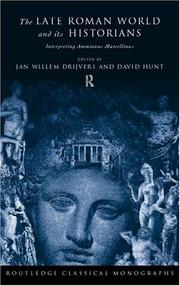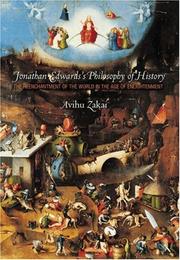| Listing 1 - 2 of 2 |
Sort by
|

ISBN: 1280026006 9786610026005 0203024893 0203170911 9780203170915 9780203024898 041520271X 9780415202718 9781280026003 6610026009 9781134631742 9781134631780 9781134631797 9780415642330 Year: 1999 Publisher: London ; New York : Routledge,
Abstract | Keywords | Export | Availability | Bookmark
 Loading...
Loading...Choose an application
- Reference Manager
- EndNote
- RefWorks (Direct export to RefWorks)
Ammianus Marcellinus, Greek by birth but writing in Latin c. AD 390, was the last great Roman historian. His writings are an indispensable basis for our knowledge of the late Roman world. This book represents a collection of papers analysing Ammianus's writings from a variety of perspective, including Ammianus as historian of, and participant in, Julian's Persian campaign, his identification with traditional religious attitudes and values in Rome and his view of the Persian Magi. The contributors engage especially with the concept of self-identification. They address the tension of Ammianus'
Historians --- Greeks --- Emperors --- Czars (Emperors) --- Rulers --- Sovereigns --- Tsars --- Tzars --- Kings and rulers --- Ethnology --- Mediterranean race --- Historiographers --- Scholars --- History. --- Ammianus Marcellinus --- Ammien Marcellin --- Contributions in history of late Roman Empire. --- Rome --- History --- Historiography. --- Historians - Rome - Biography. --- Greeks - Rome - Biography --- Emperors - Rome - Biography - History and criticism.

ISBN: 0691096546 0691144303 1400825601 9786612087745 1282087746 9781400825608 9780691096544 9781282087743 Year: 2003 Publisher: Princeton, N.J. : Princeton University Press,
Abstract | Keywords | Export | Availability | Bookmark
 Loading...
Loading...Choose an application
- Reference Manager
- EndNote
- RefWorks (Direct export to RefWorks)
Avihu Zakai analyzes Jonathan Edwards's redemptive mode of historical thought in the context of the Enlightenment. As theologian and philosopher, Edwards has long been a towering figure in American intellectual history. Nevertheless, and despite Edwards's intense engagement with the nature of time and the meaning of history, there has been no serious attempt to explore his philosophy of history. Offering the first such exploration, Zakai considers Edwards's historical thought as a reaction, in part, to the varieties of Enlightenment historical narratives and their growing disregard for theistic considerations. Zakai analyzes the ideological origins of Edwards's insistence that the process of history depends solely on God's redemptive activity in time as manifested in a series of revivals throughout history, reading this doctrine as an answer to the threat posed to the Christian theological teleology of history by the early modern emergence of a secular conception of history and the modern legitimation of historical time. In response to the Enlightenment refashioning of secular, historical time and its growing emphasis on human agency, Edwards strove to re-establish God's preeminence within the order of time. Against the de-Christianization of history and removal of divine power from the historical process, he sought to re-enthrone God as the author and lord of history--and thus to re-enchant the historical world. Placing Edwards's historical thought in its broadest context, this book will be welcomed by those who study early modern history, American history, or religious culture and experience in America.
Enlightenment --- Lumières (Philosophie) --- Lumières [Siècle des ] --- Siècle des Lumières --- Verlichting (Filosofie) --- Enlightenment. --- History --- Aufklärung --- Eighteenth century --- Philosophy, Modern --- Rationalism --- History, Modern --- Philosophy. --- Philosophy --- Edwards, Jonathan, --- أدوردس، يوناثان --- Edwards, Jonathan --- Contributions in history of philosophy --- Antichrist. --- Apostasy. --- Arianism. --- Arminianism. --- Calvinism. --- Christ. --- Christian Church. --- Christian ethics. --- Christian revival. --- Christian theology. --- Christian. --- Christianity. --- Christocentric. --- Christology. --- Church Fathers. --- Constantine the Great and Christianity. --- Consummation. --- Contingency (philosophy). --- Conversion of the Jews. --- Cotton Mather. --- Deism. --- Deity. --- Disenchantment. --- Divination. --- Divine grace. --- Divine providence. --- Doctrine. --- Dynamism (metaphysics). --- Early modern period. --- Eschatology. --- Ethics. --- First Great Awakening. --- George Whitefield. --- God. --- Good and evil. --- Great Awakening. --- Great chain of being. --- H. Richard Niebuhr. --- Herbert Butterfield. --- Heresy. --- Historical criticism. --- Historiography. --- Ideology. --- Illustration. --- Immanence. --- Infidel. --- John Calvin. --- John Foxe. --- Justification (theology). --- Major religious groups. --- Manifestation of God. --- Materialism. --- Mechanical philosophy. --- Methodism. --- Millennialism. --- Miracle. --- Morality. --- Natural philosophy. --- Natural religion. --- Natural theology. --- Old Testament. --- Omnipotence. --- Omniscience. --- Orthodoxy. --- Pastor. --- Perry Miller. --- Philip Melanchthon. --- Philosopher. --- Philosophical theology. --- Philosophy of history. --- Pietism. --- Piety. --- Plan of salvation (Latter Day Saints). --- Postmillennialism. --- Potentiality and actuality. --- Prophecy. --- Protestantism. --- Puritans. --- Religion. --- Religious conversion. --- Religious experience. --- Religious text. --- Sacred history. --- Salvation History. --- Satan. --- Second Coming. --- Second Great Awakening. --- Secularization. --- Sermon. --- Sinners in the Hands of an Angry God. --- Socinianism. --- Teleology. --- The City of God (book). --- Theology of the Cross. --- Theology. --- Theory. --- Universal history. --- World. --- Writing.
| Listing 1 - 2 of 2 |
Sort by
|

 Search
Search Feedback
Feedback About UniCat
About UniCat  Help
Help News
News